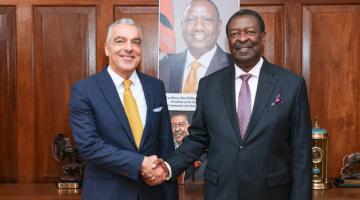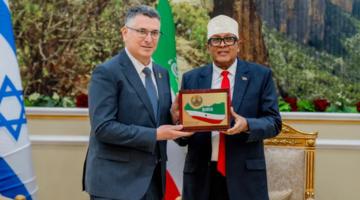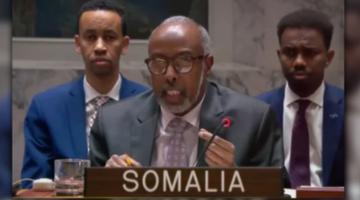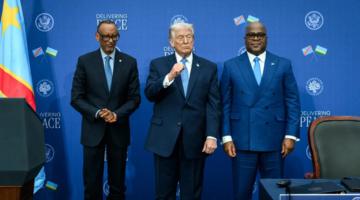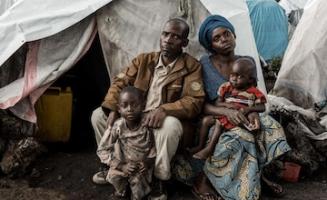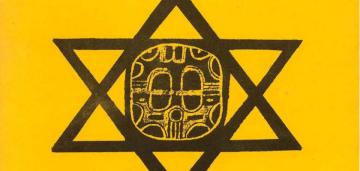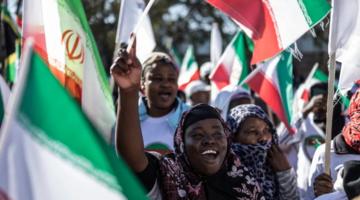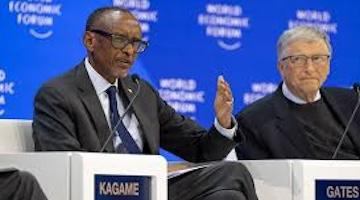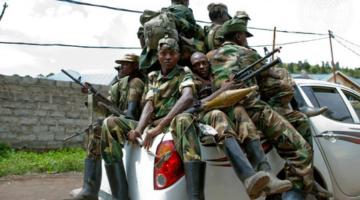Rwanda and Israel reinforce each other's license to kill based on past victimization, and Rwanda supports Israel at the African Union.
On February 18, at the annual summit of the African Union, AU security personnel removed an Israeli delegate who had arrived without an invitation. In 2021, the AU granted Israel observer status, but outcry among members led to suspension of the decision and formation of a committee to review it. Israel, with colossal arrogance, sent its envoy, Sharon Bar-Li, to the 2023 annual summit nevertheless.
The following day, after video of the incident had gone viral on social media, AU commission head Moussa Faki Mahamat said:
"We found that there is a personality who entered the room with a badge and, naturally, we asked him to leave the premises. We are in the process of making the necessary investigations because he does not reside here, he came from Israel and whenever someone arrives here, he is invited, he is invited by the chairperson of the African Union Commission. The official was not invited."
He also said:
"Last year we discussed the question of Israel's status as an observer in the African Union. Following these various discussions, the conference decided to set up an ad hoc committee of heads of state on the question, which means that the statute is suspended until this committee can deliberate. And so we did not invite Israeli officials to our summit.”
According to the Institute for Strategic Studies/Africa, 90 “external partners” have limited access to AU documents and sit as observers when invited to meetings, where “they are expected to support the AU’s work in the spirit of its founding principles,” but Israel’s accreditation has been particularly divisive.
As Israel’s Ethiopian Embassy reported, Israel had not been accredited since 2002 when it was accredited, albeit briefly, in 2021.
Much of the evolution of this situation is explained in an essay, “How did Israel end up with AU observer status?” published by African Arguments in April 2022, after Israel had been given the accreditation that was later suspended. It was written by Dialo Diop, an activist from the Palestine solidarity movement in Senegal, and Roshan Dadoo, the co-ordinator of the South African BDS Coalition. Both are spokespersons for the Pan-African Palestine Solidarity Network, a coalition of African civil society groups and activists from 20 African nations.
They write:
“The AU’s predecessor, the Organisation for African Unity (OAU), noted the similarities between the Israeli and apartheid South African regimes. At a meeting of OAU heads of state in Uganda in 1975, the organisation declared: ‘the racist regime in occupied Palestine and the racist regime in Zimbabwe and South Africa have a common imperialist origin, forming a whole and having the same racist structure and being organically linked in their policy aimed at repression of the dignity and integrity of the human being’.”
Why have so many since chosen to embrace the apartheid state? They write:
“One answer is that Israel has been increasingly muscular in its diplomatic offensive and offers of technological and agricultural support, particularly in West Africa and East Africa. Another answer lies in the fact that, in the last decade, Israeli military exports to the continent have increased by 306%. In recent years, several authoritarian regimes in Africa have also used Israeli spyware against their own citizens and even other African heads of state.
“This highlights another worrying aspect of an AU embrace of Israel. Its acceptance does not only contradict the body’s principles, but also points to the growing reach of authoritarianism, surveillance, and oppression on the continent. The growing influence of the Israeli regime in several African states is a threat to those countries’ peace and democracy.”
Rwanda, “the Israel of Africa”
After Israel’s suspension, the AU decided that a new committee would deliberate on whether to restore Israel’s accreditation. It would include three countries that opposed Israel’s accreditation – Algeria, Nigeria, and South Africa – and three that supported it – Cameroon, the Democratic Republic of Congo, and Rwanda. The committee would be chaired by the new AU chair, Senegal’s President Macky Sall.
I can’t explain Cameroon or DRC’s support, but Rwanda’s is unique and uniquely pernicious. Rwanda is often referred to as “the Israel of Africa” and it has had a very special relationship with Israel ever since the Tutsi army led by Paul Kagame defeated Rwanda’s Hutu government in 1994.
In 2012, Rwanda was one of three of 54 African member states which abstained on UN General Assembly Resolution 67/19 that upgraded Palestine to non-member observer state status in the United Nations General Assembly.
In 2013, Rwandan President Paul Kagame teamed up with Nobel Peace Prize Laureate Elie Wiesel, Rabbi Shmuley Boteach, and Las Vegas billionaire Sheldon Adelson and for "A UN Week Discussion in Prelude to the 20th Anniversary of the Rwanda Genocide and the International Response to the Syrian Chemical Slaughter," deploying Rwanda’s tragedy as an excuse for bombing Syria.
In 2014, Rwanda was one of two African nations then sitting on the UN Security Council that abstained on a vote to call for an Israeli withdrawal from the West Bank and East Jerusalem and recognize a Palestinian state by 2017. (The resolution needed a minimum of nine votes and got only 8, but the US would have vetoed it in any case.)
In 2015, Haaretz exposed the miserable fate that awaited African migrants exported from Israel to Rwanda after a deal in which Israel agreed to pay Rwanda $5000 for every African deported there.
In 2017, Kagame became the first African leader to address the American–Israel Public Affairs Committee (AIPAC) annual forum.
In 2019, Israel opened its first embassy in Rwanda.
In 2021, Amnesty International reported that Rwanda was using Israel’s Pegasus spyware “to potentially target more than 3,500 activists, journalists and politicians. It was also used to infect the phone of Carine Kanimba, Paul Rusesabagina’s daughter, of Hotel Rwanda fame.”
These are just a few examples of the special relationship between Israel and Rwanda, which is most fundamentally based on their claims to victim status, Jewish victim status in the Holocaust and Rwandan Tutsi victim status in the Rwandan Genocide.
Both nations justify all their actions by invoking these tragedies and reinforce one another’s invocations. Israel claims to be protecting itself from another Holocaust by its aggression and occupation in Palestine while Rwanda claims to be protecting itself from another genocide by its aggression and occupation in the Democratic Republic of the Congo. The Western world not only embraces their rationales but also deploys them as an excuse for allegedly humanitarian wars, like that on Libya in 2011 and the ongoing war on Syria.
President Obama formalized the Rwandan Genocide and the Holocaust justifications for U.S. military operations in the 2010 White House press release, "FACT SHEET: President Obama Directs New Steps to Prevent Mass Atrocities and Impose Consequences on Serious Human Rights Violators."
"Organization Matters. The President notes that, '66 years since the Holocaust and 17 years after Rwanda, the United States still lacks a comprehensive policy framework and a corresponding interagency mechanism for preventing and responding to mass atrocities and genocide.' The President orders the creation of an interagency Atrocity Prevention Board within 120 days from today so as to coordinate a whole-of-government approach to engaging 'early, proactively, and decisively.' "
The following year Team Obama joined NATO in destroying Libya, the most prosperous nation in Africa, after which Susan Rice traveled to Libya, then Rwanda, to say, at the Kigali Institute of Science and Technology, that the US had learned from its failures:
"This time, the Security Council acted. And acted in time. Having failed in Rwanda and Darfur, it did not fail again in Libya. Within less than two days, American firepower played a decisive role in stopping Gadhafi's forces and saving Benghazi."
It should be noted here that, in 1994, the UN Security Council was about to send additional troops to help the multilateral UN mission in Rwanda stop the massacres, but the US sent Madeline Albright to veto the measure because the US wanted to see their guy, Paul Kagame, seize power, then implement their plan to become the dominant power in Central Africa, meaning most of all DRC, which was then Zaire.
In 2020, as soon as the Tigray People’s Liberation Front (TPLF), a longstanding US puppet, started the Tigray War, Samantha Power and other stop-genocide crusaders began using the term “Tigray Genocide.” Shortly thereafter, Kagame gave an interview behind a #TIGRAYGENOCIDE caption, in which he complained that neither the US, UN, nor AU were intervening to stop it. (Fortunately the humanitarian interventionists lost that battle, when the Ethiopian government defeated the TPLF at the end of November 2022.)
The official anti-genocide campaigners most often target African nations, and never come to Palestine’s defense. Granting Israel observer status at the African Union therefore risks validating not only the Israeli settler colonial state but also validating the rationale that both Israel and Rwanda provide for “intervention” in Africa. And it should be no surprise that Rwanda supports it.
Ann Garrison is a Black Agenda Report Contributing Editor based in the San Francisco Bay Area. In 2014, she received the Victoire Ingabire Umuhoza Democracy and Peace Prize for her reporting on conflict in the African Great Lakes region. She can be reached at ann(at)anngarrison.com.


